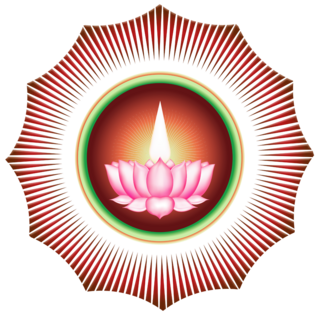
In the field of comparative religion, many scholars, academics, and religious figures have looked at the relationships between Hinduism and other religions.

Ayya Vaikundar also known as Siva Narayana or Vaikunda Swami was the founder of the Ayyavazhi faith. The Ayyavazhis believe him to be the first and foremost Purna avatar of Eka-Paran and the god Vishnu (Narayana). As per Ayyavazhi mythology detailed in their scriptures, Ayya Vaikundar incarnated in 1833, when he rose from the sea of Tiruchendur in the mortal shell of Vaikundar.

Ayyavazhi is a Hindu denomination that originated in South India during the 19th century.
Swamithope is the name of a village that lies southeast of the City of Nagercoil, the capital of the District of Kanyakumari in the State of Tamil Nadu, at the extreme southern tip of India. In the past, Swamithope was known by the name Poovandanthoppe which was part of the village, Sasthankutty Vilai Swamithope lies about half-way between the cities of Nagercoil and Kanniyakumari on the Nagercoil-Kanniyakumari road. Swamithope is located at 8.12°N 77.49°E

Nizhal Thangal also called Inai Thangals) are secondary worship places of the Ayyavazhi, often smaller in size than Pathis, built per the instructions of Akilattirattu Ammanai. Cleanliness is strictly enforced.

Pathi is the name of the primary centres of congregational worship for the South Indian religious system of Ayyavazhi, having a relatively large structure like that of a temple. They are seven in number.

Mutta Pathi, is one of the Pancha pathi, which are the primary centers for worship of the Ayyavazhi. This is the third important pilgrim center of Ayyavazhi. This place earn the religious importance in Akilam from the event that, Ayya Vaikundar is given two Vinchais here by Narayana under the Sea; One just before the arrest of Vaikundar by Swathi Thirunal and the second after the completion of Thuvayal Thavasu.

Pancha pathi are the five important pilgrim centers of Ayyavazhi. These are also considered as the primary Pathis and as worship centers of Ayyavazhi with primary status. The first pathi is Swamithope pathi itself and is the headquarters of Ayyavazhi. The other Pathis are Muttappathi, Thamaraikulam Pathi, Ambalappathi and Pooppathi.

The Ayya Vaikunda Avataram or Vaikunda Jayanthi is a festival celebrated by the followers of Ayyavazhi on the 20th day of the Tamil month of Masi, the date on which the Ayyavazhi followers believe that Lord Narayana himself incarnated as Vaikundar during an encounter with a deity Goddess Lakshmi, he was beget inside the sea and arose from the sea of Thiruchendur on Kollam Year 1008 at 20th day of Tamil Month Masi. He took the human form as Narayana Pantaram at Tharuvaiyur near seashore to destroy the evil spirit of Kali and transform the Kaliyukam into Dharma Yukam.

The following outline is provided as an overview and topic guide to Ayyavazhi:

Ayyavazhi theology is the theology of a South Indian religious Faith and officially a sect of Hinduism known as Ayyavazhi. Several fundamental theological beliefs distinguish the Ayyavazhi tradition from Hinduism.
Ayyavazhi, a belief system originating from South India, is mentioned in a number of reports by Christian missionaries in the 19th century. In some of these reports, it is claimed that Ayyavazhi is an anti-Christian religious phenomenon. The rapid growth of the London Missionary Society is heavily challenged by Ayyavazhi in Thiruvithancore, which is the most succeeded venue of LMS in India and revealed in certain reports.

The Ayyavazhi symbolism deals with the symbols which are used in or used to represent Ayyavazhi. Though Akilam the scripture of Ayyavazhi does not point out any symbol directly, there are a few symbols which are used for representing Ayyavazhi which came into practice gradually.

The purpose of this chronology is to give a detailed account of Ayyavazhi from the beginning of the incarnational events of Vaikundar to the present time. Question marks on dates indicate approximate dates. A star (*) indicates the mentioning of that particular date in Akilam or Arul Nool. All dates but a few are found in the Tamil calendar and so doesn't coincide exactly with the months of the Gregorian calendar. The dates may span over any halves of the two consecutive months (Gregorian).

Inclusiveness and exclusivity in Ayyavazhi is the inclusive and exclusive ideology of Ayyavazhi scriptures over other religions. The formula of inclusivism and exclusivism was applied in the religio-cultural universe of Ayyavazhi is one that is not found anywhere else in the world. Though there are separate verses towards inclusivism and exclusivism as central themes in Akilam, the mixture of both is unique. The inclusivistic theory of accepting the views of different religions for a certain period of time and from then onwards exclusivistically rejecting all of them by narrating that all the previous had lost their substances is a mythical as well as religious break-through.

The ethics of Ayyavazhi are found scattered throughout the primary scripture, Akilathirattu Ammanai. They are also integrated with the meta-narrative mythography. However, regarding ethics, Arul Nool is considered as an accumulation and prophecy of the core concepts found in Akilathirattu. In Akilathirattu, the ethical abstracts are pointed out as "told by God" at several places at different situations to lesser god-heads, devas, saints etc. when asked by them.
Anbukkodimakkal Thirucchabai is a democratic bureau established by the religious headquarters of Ayyavazhi in the late 20th century. It was one among the latest developments in the religious history of Ayyavazhi.

The Nizhal Thangal, Attoor is one among the few renowned Worship centers of Ayyavazhi in the western Kanyakumari. It is also the second Thangal built in the Thamarai Thangal series only after the Nizhal Thangal of Nelli-ninra Vilai, and the first ever Temple built with the Sahasrara architecture.
The Nizhal thangal of Nelli-ninra Vilai is one among the few important Worship centers of Ayyavazhi in the western Kanyakumari. It is also the first Thangal built in the Thamarai Thangal series.
Prajapati is a Vedic deity of Hinduism.






